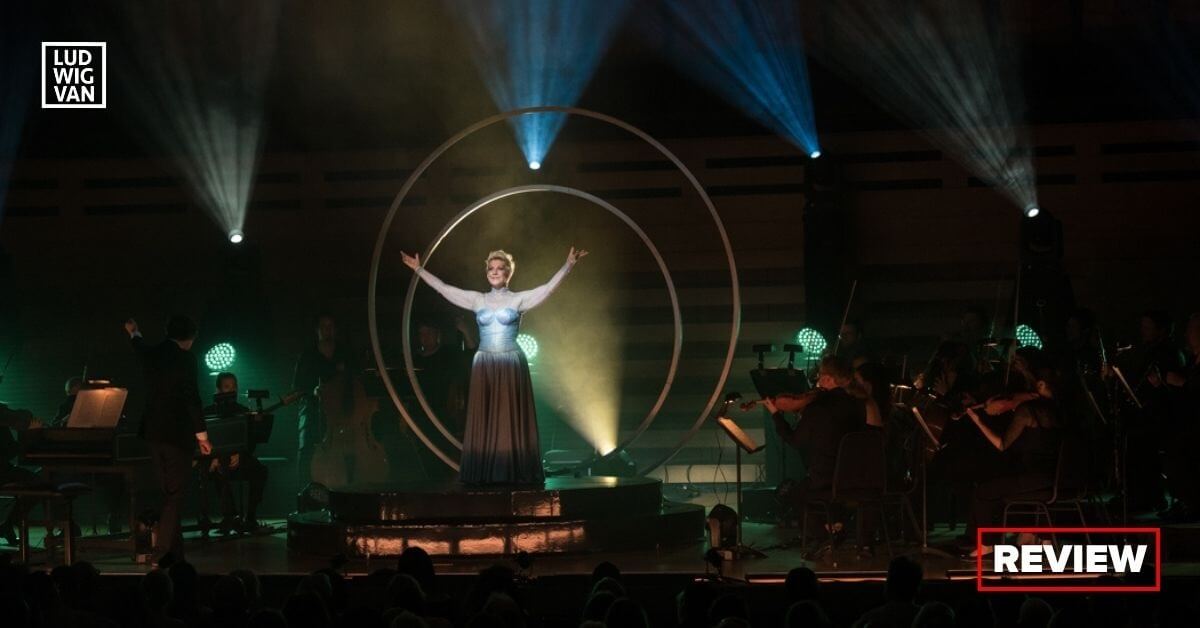
Joyce DiDonato, mezzo-soprano & executive producer, Eden; Il Pomo d’Oro, Maxim Emelyanychev, conductor. Koerner Hall, Apr. 19, 2022
For music lovers of a certain age, yours truly included, the classical song recital of yore was typically a rather formal affair steeped in the historical tradition. The singer, conservatively attired in evening wear, stands in front of the curved tail of the concert grand, hands clasped, delivering the songs Lotte Lehmann-style, with sincerity and beauty of tone, but with little fanfare other than the appropriate expressiveness.
At least, that was my experience of the classical vocal recital as a young student over half a century ago.
Compare that to Eden, a recital given by the renowned American mezzo Joyce DiDonato at Koerner Hall on Tuesday, this genre has come a long way! If I didn’t know better, I would have thought I had wandered into a light show featuring pop music. Instead, it was a meticulously curated classical program with a serious message. It’s a show that DiDonato is investing a great deal of her energy. Through music, song text and evocative staging, the show celebrates the power and beauty of nature, while underscoring the ills of humanity in its destruction of nature and societal discord. It serves as DiDonato’s personal and musical rallying cry.
Themed classical recitals are not new in Europe and the UK, but very rare in North America. A show as elaborate as this one on our shores? Not to my knowledge.
Concerts with a message define DiDonato, such as her In War and Peace program a few years ago. A “musical activist,” she utilizes her artistry to promote a cause. She’s taking Eden on a global tour of 45 venues on five continents that started last fall and will conclude in 2024. A CD has just been released on Erato. There are education programs involving young people and multiple partnerships at every stop. Rapturously received at the Barbican Centre in London earlier this month, it wowed everyone in Chicago a few days ago, and is set for its date at Carnegie Hall in New York this coming weekend.
The Koerner performance opened in near total darkness, with her voice in a rather disembodied tone permeating every inch of Koerner Hall. Eventually she was revealed centre stage on a circular platform surrounded by curved metallic pieces. She proceeded to sing an eclectic selection of songs, beginning with Charles Ives’ “The Unanswered Question” and ending with Mahler’s deeply contemplative “Ich bin der Welt abhanden gekommen,” from the Ruckert Lieder. All songs were selected for the relevance of the text to nature, personal and environmental renewal. Her movements were highly choreographed, enhanced by very effective lighting.
To be honest, I had to pinch myself: “This is a classical recital?” But, DiDonato and her creative team managed to make it work. I found myself mesmerized by what I was seeing onstage.
Playing no small part was the excellent Il Pomo d’Oro, led by conductor Maxim Emelyanychev. Essentially a Baroque ensemble, it ventured into Mahler and Charles Ives most convincingly. With a good 70 minutes of singing by DiDonato, only punctuated by a couple of orchestral pieces by Uccellini and Valentini. I was grateful that there were translated song texts projected onto the proscenium.
Later in the concert, DiDonato spoke directly to the audience about the raison d’etre of her program, in a mix of humour and heartfelt messaging. Joining her were young students from Raise Her Voice Chamber Choir, in the Oakville Choir for Children and Youth. Together they sang a newly composed song, “Seeds of Hope.”
The show ended with two additional pieces that acted as quasi-encores. “Schmerzen,” the fourth Wesendonck-Lieder by Wagner, with its last lines ending in a praise of nature. The final song was the wonderful “Ombra ma fu” from Serse by Handel, also in praise of nature.
Throughout the concert, there were huge ovations. At the formal end, DiDonato and the other artists were given thunderous applause and standing ovations. Everyone was given a memento at departure — a disc of “Seeds of Hope.” My concert companion reminded me of Bernstein’s “Make Our Garden Grow” from Candide. I can’t wait to grow my seeds of hope!
#LUDWIGVAN
Get the daily arts news straight to your inbox.